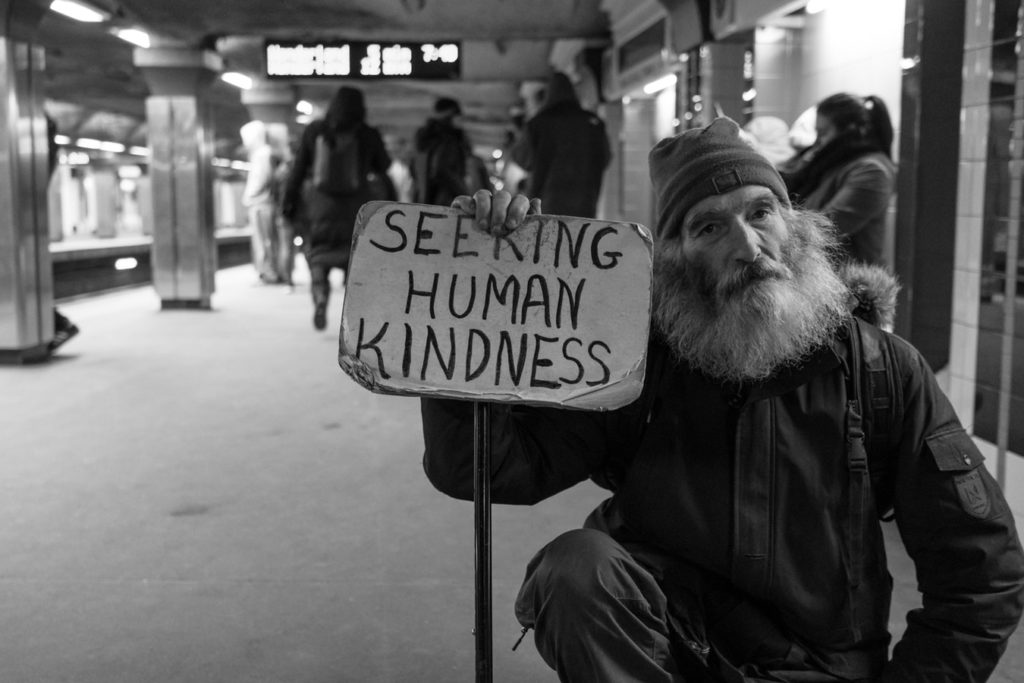July 10, 2022
The Rev. Canon Marianne Borg
Trinity Episcopal Church
Bend, Oregon
Luke 10:25-37
Love the lord your God with all your heart, and with all your soul, and
with all your strength, and with all your mind; and your neighbor as
yourself. Familiar words to us. What do we love when we say we love
our God? Consider the neighbor. And who is my neighbor?
Luke follows this question with a parable. Also familiar to most of us.
We call it the parable of the Good Samaritan. To call a Samaritan good
is like calling good Friday good. It’s a disturbing pairing.
The Samaritans claimed that theirs was the true religion of ancient
Israelites. And Mt. Gerazim, in their territory, was the holiest place on
earth. The Judeans claimed that the holiest place on earth was the
Temple Mount in Jerusalem. And Judaism was the true religion of the
ancient Israelites. The Samaritans and Jews claimed their rival
authority in the name of God. Their God. The Samaritans and Jews were
enemies.
The Parable. Parables are stories that never happen. They are fictional
events. About fictional characters. They aren’t literal descriptions.
And they describe a scenario, putting together or throwing together
(which is what parable means) events and characters along-side each
other that intentionally subvert social expectations. Parables turn
things inside out or upside down. And the hearers of a parable are to
ponder what they hear, what they think is going on, where they see
themselves in the story and what they might do. Parables are not tidy
little moral tales with a predetermined ending. They are stories
intended to disturb and disrupt. And make you think again.
Parables were Jesus favorite teaching style. Through them he
challenged conventions, suggested different ways of seeing the world,
even a new way. And his parables drove people crazy.
We have always said The Good Samaritan is a parable of Jesus. And for
good reason. And it is presented as such by Luke. But I had a thought
about this parable in light of the fact that this parable is only found in
Luke. I wonder if this parable is actually a construction of Luke’s.
Conceived and delivered in the name and Spirit of Jesus. But made up
by Luke.
If so, it tells me that Luke so understood parable as a teaching style and
so understood how Jesus would have us think differently, that he could
construct such a parable himself. What better way to illustrate that
you understood what the teacher taught. And he comes up with this
story as a response to the great commandment and the question who is
my neighbor. It’s a brilliant parable. Whether the parable is Jesus’ or
Luke’s doesn’t really matter. It doesn’t affect the importance of the
parable which is after all about how things might look different or how
we might see differently in a kingdom of God. The Good Samaritan is a
case in point.
This parable I suggest is about hospitality. The word hospitality is from
the Latin hostis which is the same root for host, and guest. It is also the
same root for stranger and enemy. And for hostile. There is ambiguity
then in offering hospitality. You might say hospitality becomes an
existential choice. To be open or isolate? Not knowing if the knock at
your door or cry from the street is from guest or stranger or enemy.
Offering hospitality understood in this way then is a risk.
I suggest the hospitality Jesus practiced was unconditional hospitality.
By unconditional I mean offered without return in mind. Offered
without expectation that such offering will accrue a benefit. It is not
about reward or favor. It is not part of an economy of exchange. It is
given because it is given. Without a why if you will. Jesus provided
hospitality to whomever was in need. The kind of hospitality offered in
the desert. The desert can be hostile. You can die in the desert. When
someone comes in need of water or food or shelter you don’t ask who
they are and if they have proper papers to be in your territory.
Unconditional hospitality asks no questions. That is what Jesus
practiced. And it was risky.
Let me say the obvious here. Unconditional hospitality is not how the
world works. Not in Jesus’ time. Not in ours. But this was the way
Jesus visioned how we can be with one another, how we must be with
one another, and he showed it was possible. Such hospitality is
testimony to the presence of the kingdom of God.
The parable of the Good Samaritan:
The story takes place on a public road. I love that. The kingdom of God
takes place on public roads.
So a priest and Levite are returning from Jerusalem. Where it is
assumed they underwent their required purity rituals and rites. They
saw a man lying in the road. Beaten, bloodied, maybe dead. Now
according to purity custom if a priest or Levite were to touch a person
bloodied or dead or even come under the shadow of such a person
they would be rendered unclean and unable to perform their sacred
tasks. And then they would have to go through rites of purification all
over again. Being faithful to the requirements of their call the priest
and Levite avoided the man in the road.
We might understand that. For many of us it is important to stand by
the beliefs we’ve been taught. It shows our fidelity and obedience to
our traditions and its institutions. And it pleases God that we do. Or so
we are told. And it shows solidary with our community.
Here enters a Samaritan. On the public road. A geographical neighbor.
And a follower of a rival cult. An enemy for sure. Without any apparent
hesitation the Samaritan reaches out and attends to the man in the
road who might be dead or dying. That would have meant
contamination for the priest and Levite. And for the Samaritan it might
have risked his life. The dying man might have thought it was the
robber left him for dead but just in case he wasn’t dead yet, came back
to finish him off. Or because the man in the road was most likely a
Jew, seeing it was a Samaritan coming toward him he may have resisted
and become hostile. So, the Samaritan risked his own well-being and
even life for the sake of the other. An enemy at that.
We call this story the Good Samaritan It could be called religious and
political rivals meet on a public road.
So who is the neighbor in this story? Is it the Samaritan who is
geographically right next door? Or is it the Samaritan because he was
the one who offered compassion? Or is it the man in the road because
he received care and compassion? Or is it the priest and Levite who do
love the Lord their God. I suggest they aren’t being considered.
Regardless of how you figure out who is the neighbor, the hearers of
this parable knew what Jesus would do in such a circumstance.
Because he had done this kind of thing many times before. Jesus would
have reached out to the wounded man in the road. He would have
reached out without a thought about whether he was dead or not,
whether getting near him would make him clean or unclean, whether it
was the sabbath or not, whether the man was a Jew or an idolator,
whether the man was worthy or not, or would or could repay him.
Jesus would have reached out and touched that man and done
everything he could to help him. Just like the Samaritan did. Jesus and
the Samaritan then, in this situation, are one and the same. That’s a
disruptive thought.
The situation on the road could not have been predicted. Nor the
outcome. The priest and Levite’s response was understandable. They
were upholding the requirements of their holy professions, their holy
calling. It was the Samaritan who offered unconditional hospitality,
unconditional care to the man in the road. There is ambiguity and
discomfort built into this story. But it is clear the Samaritan did the
“good” deed. It was a risk for sure. And he saved a man’s life.
Perhaps you can imagine an updated scenario. About rival parties.
Political and religious. Meeting in the public square. An occurrence of
violence. How to respond. What about risk? What about liabilities?
When does concern for personal safety compromise compassion? And
what about your beliefs? What is it to act in the name of your God?
What do you love when you say you love your God?
Remember a parable puts together or throws together things that are
not programmed and not necessarily compatible. But the art and
potential healing power of the parable comes when you struggle with
the story, listening deeply to the needs of those in the story, and then
consider how you would respond. We listen and hear differently. And
respond differently. But as followers of Jesus we know there is no “us
and them,” there is no “not my people,” there is no “least of these.”
Were it not for the accidents of birth the other could be you.
Jesus was a genius at telling parables. He was actually a parable
himself.
So even though this story never happened the hearers of Luke’s story
knew that something like this could happen. And they could not but ask
what would Jesus do?
Love the Lord your God with all your heart, and with all your soul, and
with all your strength, and with all your mind; and your neighbor as
yourself.
This is a call. A promise. A demand. Requiring a response. That is a
risk. “A beautiful risk” (Levinas). Wouldn’t you say? Or do you agree?




This is a true story, or as a Native American might have said, “We don’t know if it is true, but we know that it happened.”
Thank you for the explanation of what a parable actually is, and for all your posts. They are so necessary to our world.